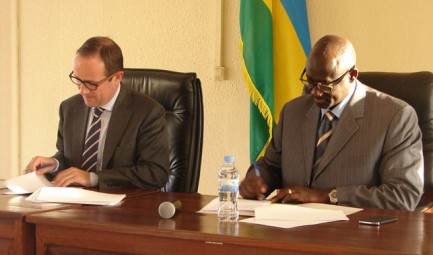The ‘raison d’être’ of Survivors Fund (SURF) is to respond to an explicit need from survivors of the Rwandan genocide against the Tutsi. A visiting European supporter group to Kigali, in July 2014, asked us about the negative connotations of the word “survivor” and why survivors still have needs today, twenty years on. These are good and understandable questions, and ones that we ask ourselves daily in order to stay on track and true to our mission. I responded first about the empowerment and strength of the survivor identity, second, about the tiny space in time for people to recover from terrible atrocities, third, about the very real needs today and finally, with my own question… would Europeans ask this of a Jewish survivor seventy years after the Holocaust, or indeed to a second generation survivor?
Identity is a complex matter and very much so in Rwanda – in the tremendous effort to rebuild Rwanda beyond ethnic and other lines, whilst victims and perpetrators live side by side in their rural, hilly communities, being a survivor is double-edged. Yet, what we have seen in our work in 2014, and over nearly twenty years, is survivors becoming stronger, growing beyond victimhood and rebuilding themselves to become highly active individuals and members of their communities. No one in Rwanda wants to see genocide happen again, and what is truly inspirational about survivors is their commitment to making this a reality, whilst they overcome their personal challenges.
So “survivor”, at least to me, has a highly positive connotation. I am proud of our work as Survivors Fund, and grateful for the lessons we learn from survivors and from local survivor NGOs. As much as we give to them, they give to us, and to us all – it is truly a reciprocal process in pursuit of a better, brighter world, with survivors at the centre. Survivors personify resilience, and those survivors who are too weak or too ill, engage our compassion and responsibility to act.
We achieved some very important milestones in 2014, not least in highlighting the ongoing needs of survivors, continuing the remarkable work in programmes addressing poverty reduction, women and girls issues, economic empowerment, mothers and their children born of rape, trauma counselling and justice. A notable achievement was our work with local NGO partners in the call for action around international reparation to survivors and the subsequent MOU between the Government of Rwanda and the International Organisation for Migration, leading to a report into potential vehicles to reparation. At the time of writing this, we still await the outcome, but are confident of the publication of the final report.

We are grateful for the public recognition of SURF’s work. Baroness Warsi told us: “Survivors Fund (SURF) is carrying out hugely important work, giving those survivors a voice, addressing their needs, including the needs of those that suffered sexual violence during conflict, and ensuring that the international community does not forget them.” William Hague wrote to us to say: “The work that you are doing with mothers and children born or rape is inspirational. Support for survivors is an area of work where I believe that there is much more we should be doing – in Rwanda and around the world.”
Most important to us is the feedback from the people we work for. Our programmes are driven by their needs and contribution, which is why we will continue the effort with key programmes around youth and economic development, ageing survivors, children born of rape, women and girls and counselling and justice. I wish to thank all of you who are involved in helping us to achieve these goals.
Françoise Lemagnen, Chief Executive
August 2015
